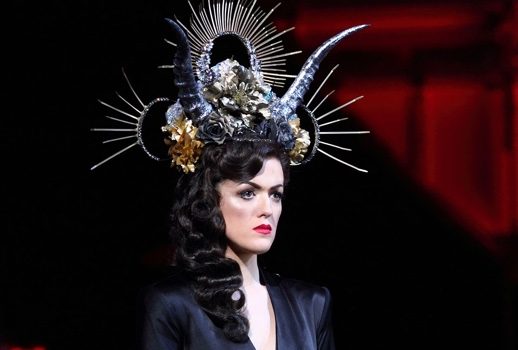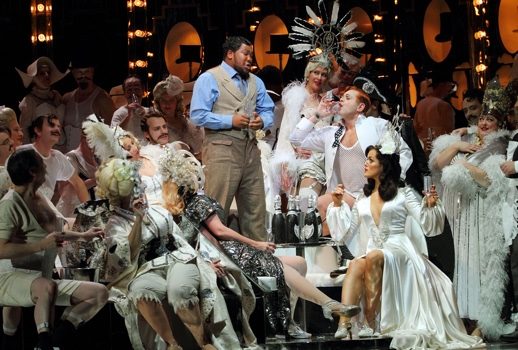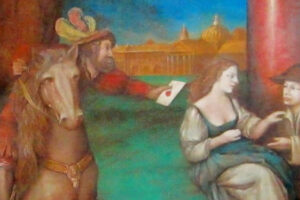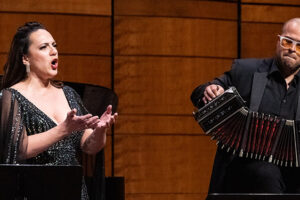

With the Royal Opera House keeps reviving the 25 years old Richard Eyre production (next season with four different cast combinations) any effort to update this intrinsically contemporary drama is to be praised. Parties involving excess, drugs and non-normative sex is what we should expect from the modern-day equivalent to the Parisian courtesan society. The phenomenon of powerful men abusing defenseless women has sadly changed little from the salons of 19th century Paris to 21st century London’s elite clubs.
A highlight of this production (seen March 28) is the direction of the performers. Violetta’s character evolution is charted in gripping detail: She feels restrained happiness during the first act with delicate movements, morphing into a mad attempt to hiding underneath the country house grass after breaking up with Alfredo. At Flora’s party she ends in crazy hysterics. Kramer plays the final act without the traditional bed, sending Violetta reeling from weakness/illness to strength/happiness most credibly.
Alfredo is played more as a fool than as a passionate man, a big spoiled boy wearing suspenders. At the second party he tries to be a bad boy drinking and striking poses. The playing cards are not left on the table but sent flying in the air. And yet this Alfredo wins sympathy as we realize that “Questa donna conoscete?” is not so deeply meant.
Germont, though, doesn’t work. We have no sense of his representing the fatality and oppression of a hypocritical society. All we can tell is that he is static and rigid.
The supporting characters in the parties were splendid, with extreme and provocative behavior helping to set the context. Gastone indulged in rude gestures while Flora represented the more cynical, businesslike side of the system. The usually problematic gypsy and toreadors ballets were brilliant solved, making perfect sense in the context of the party: a parade of fetishes as the onlookers grow ever more aroused.

Alfredo was sung by Lukhanyo Moyake with a light and fresh voice that matched well the naivety of his character. He had to make efforts to deliver some forte notes during the “Questa donna conoscete” scene (standing on his tip toes!) but reached them just fine with a ringing top.
Alan Opie, despite being warmly received during the applause, was the weakest part of the cast. His acting was rigid his singing monotonous, without any dramatic accent. It was not only boring but also deflated the drama from working, removing all the darkness and cruelty that the character should bring to the story. I didn’t even mind that his cabaletta was cut, as he probably would have been unable to sing it well anyway.
The ENO chorus was on top form and the musical direction from Leo McFall was excellent, with dramatic pulse and clear delineation of details.
The English translation was, along with the dull Germont, the weakest point of this production. It inconsistently removed details from the original (references to Paris, Provence and Madrid references were excised from everywhere but from “Parigi o cara.” Even worse, the English version offered embarrassing primary school rhymes, changes of text in repeats on the repetitions, and extra syllables distorting the declamation. After so total a disaster, we have to ask once again if opera must be in English to be considered “national.”
Photos: Catherine Ashmore























Comments